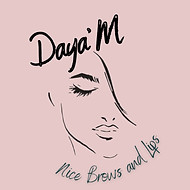PMU FAQs
- Shemina Daya

- Apr 19, 2021
- 4 min read
Updated: Dec 13, 2023
Microblading:
A procedure categorized under permanent makeup, but unlike traditional tattooing, it is less invasive and is considered semi-permanent. Microblading typically lasts 1-3 years, depending on skin type, sun exposure, lifestyle and skincare routine. The procedure is done by using a hand tool with ultra fine needles and each ‘hair’ is gently etched into the skin, giving an incredibly natural and realistic look. Microblading can dramatically correct or fully reconstruct lost eyebrow and is excellent for those wanting to enhance their brows or who have little to no eyebrows, thinning brows from age or over tweezed brows. Pigments used are chosen to match the natural or desired brow color and skin tone will also be taken into consideration. Microblading is not recommended for mature, oily skin or skin with big pores.
Powder: Unlike traditional cosmetic tattooing, it is less invasive and is considered permanent. Microshading is different from microblading because everything is done with machine technology. Powder brows typically lasts 1-3 years, depending on skin type and skincare routine. This procedure can dramatically correct or fully reconstruct lost eyebrow and is excellent for those wanting to enhance their brows and achieve a more ombre, make up effect. Pigments used are chosen to match the natural or desired brow color and skin tone will also be taken into consideration. Microshading is suitable for all skin types, especially mature or oily skin and previously microbladed brows.
Combo Brows:
Combo brows are just that, a combination of hair strokes and microshading. The hair strokes or nano strokes are placed at the bulbs of the brow and gradually blended into the body and tail with shading. The entire treatment is applied with a machine - including the hair strokes. This is an excellent option for those lacking hair and wanting a natural, yet full brow. This procedure is suitable for all skin types. Combo brows typically last 1-3 years.
Why Do I Need a 6-8 WeekTouch Up?
All permanent make up procedures are a two-step process. The touch up is required to correct any areas that may have not retained pigment. Touch ups are also required to make any necessary adjustments such as darkening the color or tweaking the shape. The entire brow or lip is treated again with focus on areas needing improvement. Your permanent make up will last longer with this required touch up.
Does It Hurt?
A highly-effective, topical anesthetic cream is used during your procedure to keep you as comfortable as possible. Pain threshold levels vary from person to person. Having this service performed during your menstrual cycle may increase discomfort during your procedure. If you are a frequent smoker, the topical anesthetics used during the treatment will not last as long. Be aware that if you have been diagnosed with Fibromyalgia, it may affect your sensitivity tolerance to the procedure.
Is it permanent?
Permanent makeup treatments are permanent and will not wash off, however, they will fade over time and may need to be refreshed with a follow up appointment. Frequency of sessions depends on a number of factors including: the pigment colour used (lighter colours fade faster), lifestyle (sun exposure), and if any chemical peels come into contact with treated areas.
Please note that final results CANNOT be guaranteed as each unique skin type will hold pigments differently and break down at different rates. Multiple sessions are normal for cosmetic tattoo procedures, with each new procedure requiring a minimum of 2 visits.
What are the benefits of permanent makeup?
Saves You Time
It’s simple: how much time do you spend each day applying and removing your makeup? Now imagine if you had all that time to do other things, like get a little more sleep in the morning or spend a little more time with your family. PMU gives you a permanent, professional application of makeup, without having to apply it – ever.
Gives You Confidence
How many times have you gone into a business meeting, or had a get together with your old college friends, but you were preoccupied with whether or not your makeup looked right? Now you can go into any social or business situation focused on the task at hand, confident that you look your best.
Designed for Your Features Your permanent makeup application is designed especially for your needs. Whether you want to replace or enhance your eyebrows, or enhance your lips, permanent makeup will give you the look you want and match it to your skin tone. It’s like having your makeup done by a professional every morning!
No Smudging Imagine, going to the gym, or swimming, and not wondering about the horror show that your makeup must be! Permanent makeup is not a new procedure. As a form of tattooing, it’s been around for thousands of years. Today, more and more women are discovering the benefits of permanent makeup to help themselves look better, feel better and, ultimately, get more enjoyment from life.
What are the side effects?
There’s always a risk of infection when needles are involved. This is especially true if the needles used haven’t been properly sterilized. Your body can react to the foreign ink particles and form areas of inflamed tissue. If you’re prone to them, the tattoo process also can leave keloid scars.
People also can be allergic to a particular color or type of tattoo ink. Other possible complications include bleeding, crusting, swelling and hypo/hyper pigmentation.



